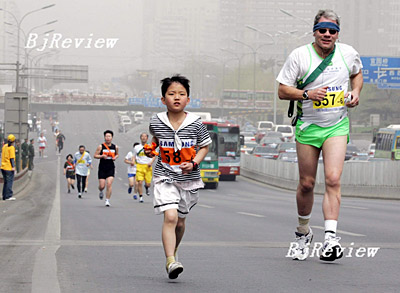
"From mountains caressed by the sun, through gardens radiant with roses, to extraordinary turn-of-the-century architecture, there is nowhere else quite like Pasadena…" Pasadena, Calif., Convention & Visitors Bureau.
Nestled in the lush San Gabriel Valley of the greater Los Angeles area, Pasadena, Calif., is the city of roses, and a regional center of art and music. The Rose Bowl hosts the oldest and most famous college match-up for American football every year, commemorated with a nationally televised parade of flower-covered floats. The town is famous for good weather, little old ladies who drive fast cars and for being a showcase for southern California-style paradise all year long.
It is also home to Alan Lamson, Chair of the China Subcommittee at local Pasadena City College. Lamson recently returned from a trip to Beijing, where he visited a cultural festival in Xicheng District, a "sister city" of Pasadena since 1999.
During the trip, Lamson led a team of Scottish bagpipers and drummers from Pasadena to the festival in Xicheng. The pipers played in a local park, cultural institutions and atop the Great Wall. The sight of a team of Scottish bagpipers from southern California may be an odd sight in the Chinese capital, but next year the tables will be turned when Beijing sends a flower-covered float celebrating the 2008 Olympics down Pasadena's famous Tournament of Roses parade.
Originally the Pasadena Council hoped for at least one cultural exchange a year, but the relationship has exceeded expectations, with as many as half a dozen exchanges and numerous offshoot programs generated through the sister city relationship with Xicheng. Most of the exchanges and programs held by the sister cities are focused on art, culture and education, Lamson said, rather than business or economics. The two cities have participated in a library exchange, art exhibitions, sporting events and language programs. A "perfecting English" campaign by Pasadena is helping Xicheng officials to correct any errors in English-language signs and materials displayed around the district ahead of the upcoming Olympic Games.
Lamson said he now travels to China once a year, and sometimes twice a year. Before the sister city relationship was formed, he had been to the "middle kingdom" only once, in 1987.
"It was a time when you saw hardly any automobiles on the road, and when I asked a young Chinese tour guide: ‘who was a rich man in China?' He pointed over to a man with a little motor scooter with a dozen ducks hanging off the back," Lamson recalled. "Now, when you go to Beijing there are Rolls-Royce dealerships, Lamborghini dealerships-incredible signs of wealth all in less than 20 years."
Under the sister cities umbrella, the cultural exchanges through the program have done much to broaden Lamson's knowledge of Chinese life, who said he grew up in the generation of Americans warned about "Red China" and the evils of communism.
"When we first started making contacts with people in China, there were people in the Pasadena community who really had very mistaken ideas about China. They thought if you went there, people would watch you all the time and assign someone to watch you. That might have been true in the very earliest days, but now when you go to China you can pretty much go anywhere you want," Lamson said.
One program that touched Lamson in particular was a visit to the Cochlear Implant Users School in Xicheng-a school for deaf children who have received cochlear implants to regain the ability to hear.
"We went there and saw these little kids who had just had this operation and were learning to hear and to speak for the first time. It just touched us so much that we decided that we would raise funds for the school because they were largely supported privately rather than by the government," Lamson said.
For the past three years, the Pasadena group has raised about $2,000 annually for the school. The donation has also led the Beijing Government to increase its funding to the school as well, Lamson said.
"In some ways, it's the most gratifying thing we've done," he said.
Pasadena formerly had a sister city in Fujian Province, but the coal-mining town didn't seem like a good fit for laid-back Pasadena. Lamson said the board then searched for two years for more appropriate Chinese sister cities. Six potential partner cities made the cut, and Xicheng was eventually unanimously approved, he said.
"We were looking for a number of items, among those a city with significant cultural institutions, a city that was relatively easy to get to, with an airport nearby, and a city that had already had some experience with exchanges," Lamson said, adding that the ability for student homestays was also a key factor. "Xicheng was the most responsive of all of the groups."
Though the city's sister city board was fully in favor, the approval of Xicheng "barely squeaked by" a vote of the general city council, who voiced concerns over human rights conditions in China. Since then, both sides have learned a more complete picture of each other, and the relationship has helped to bridge two very different cultures.
"I feel that both sides are in it to genuinely improve relationships with the two cities, which may in a small way add to the improvement of understanding between the two countries. I hate to make broad claims, but I think any time when people get together and discuss issues of common interest, it helps in some way," Lamson said.
(Reporting from New York) | 